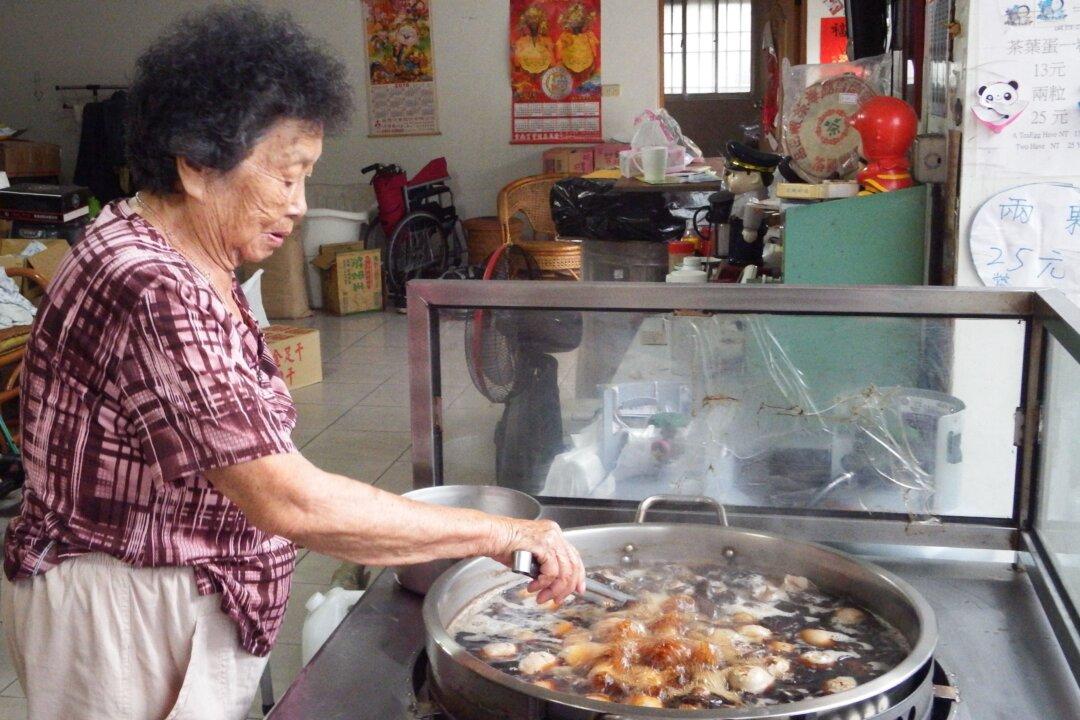At age 86, Jin-Pen Tsau could be taken for a stereotypical Taiwanese matriarch. However, her wrinkled face and gnarled hands belie her sharp business acumen, not to mention her natural talent for marketing and media relations.
She is the owner and CEO of a small family-run enterprise that has parlayed one of Taiwan’s and China’s most popular street foods into a successful business.
Known around Sun Moon Lake, one of Taiwan’s most popular tourist destinations, as the tea-egg grandmother, she prides herself on running the only tea-egg shop that makes a sufficient profit margin to pay taxes to her government.
Tea eggs, with their pungent aroma and dark brown shells resembling dyed Easter eggs, are a favorite snack food with locals and visitors from Mainland China. They are sold at night markets, small shops along the streets, and at Seven Eleven stores in both countries.
As Tsau bends over a gigantic metal pot, boiling and then simmering the eggs for about three hours in a mixture of tea and soy sauce, she politely declines to divulge her recipe.
“My eggs are cooked with love, and that’s my secret recipe,” she says through a translator. It’s obvious that she loves what she’s doing.
However, there is a small cloud hovering over her sunny world. Her business is located near a popular tourist resort, and according to officials at the Tourism Bureau in Taipei, the number of tourists from Mainland China (her most consistent customers) has declined by 15 percent in the last two months.
This decline has coincided with the change of government in Taiwan this year. The DPP (Democratic Progressive Party) under the leadership of President Tsai Ing-wen took over on May 19.
“My business is down by one third from last year,” Tsau says.
Unlike the former KMT (Kuomintang) government of President Ma Ying-jeou, Tsai’s party has traditionally held Beijing at arm’s length in a bid to preserve Taiwan’s de facto independence and democratic institutions.
Asked if this tourist decline has anything to do with the change of government in Taiwan, Tsau answers with the air of a business executive who has been trained to deal with journalists.
“Politics is not my field. I am a businesswoman and know nothing about politics,” she says carefully, but with a twinkle in her eye.
Her husband Chan Wan-Hu, 84, who oversees the business end of things while Tsau focuses on production, nods in agreement.
Is she worried about declining numbers of Chinese tourists?
“Not at all,” she says with a bright smile. She adds that tourists from other places such as Japan and other parts of Taiwan can make up for this loss.
Clearly, she isn’t putting all her eggs in one basket and is counting on diversifying and expanding her market.
Pursuing Other Markets
Unbeknown to Tsau, her approach is the same as that of the trained tourism bureaucrats in Taipei.
Going after other markets is what the Tourism Bureau of the Ministry of Transportation and Communications is planning to do in response to fewer visitors from Mainland China.
Tourism represents three percent of Taiwan’s GDP and brought in US$16 billion last year.
Eric Lin, director of the International Affairs Division of Taipei’s Tourism Bureau. admits that tourism from Mainland China has been down by 15 percent in the last two months. This is a noticeable difference from the previous five years under the Ma government when tourists from China accounted for 40 percent of all visitors.
Asked if the decline is a coincidence since President Tsai was inaugurated, or whether Taiwan is being punished by the Peoples’ Republic of China, Lin replied that there has been no official announcement regarding any new policy from Beijing.
“Our counterparts in Beijing have told us that it’s just a decline in business,” he says, implying that there is no conclusive proof it is related to the current state of Beijing-Taipei relations which are not as cosy as they were in President Ma’s time.
His bureau’s strategy to counteract this trend is to promote Taiwan as a tourist destination in other countries such as India, and also in what he describes as the “Muslim” markets of Indonesia, Malaysia, and Pakistan. To cater to the latter, the government is creating a “Muslim-friendly” environment with a prayer room at Taoyuan International Airport in Taipei and a list of halal restaurants for Muslim tourists.
Taiwan is also planning to simplify visa requirements for citizens of India, Thailand, Vietnam, and Philippines in a bid to boost tourism.
The North American market has much potential for growth too, said Lin. He noted that last year Taiwan had 600,000 visitors from North America, including 485,000 from Canada. “We plan to increase the number of flights from Canada,” he added.
Taiwan is also planning to cooperate with the Hong Kong Tourism Bureau to enable tourists to plan one itinerary with two destinations- Taipei and Hong Kong.
With much to offer—including spectacular scenery, a unique eco-system, mountaineering and biking, world-class urban amenities, and the best of traditional Chinese culture that has been preserved from destruction in China’s cultural revolution of 1949—Lin is confident that the drop in the Chinese market is only temporary.
“The PRC market is important to us, and we are sure it will improve soon,” he said.
These are exactly the thoughts of Jin-pen Tsau, the tea-egg grandmother of Sun Moon Lake.
Susan Korah is a freelance journalist based in Ottawa. She has a Master of Journalism degree from Carleton University, and writes on Canadian and international politics as well as travel and lifestyle.





